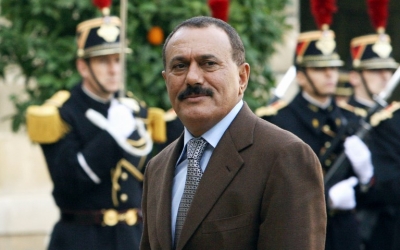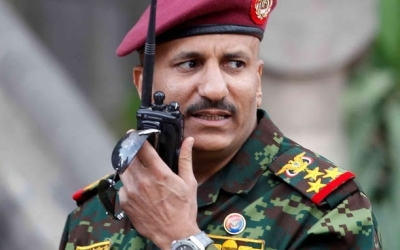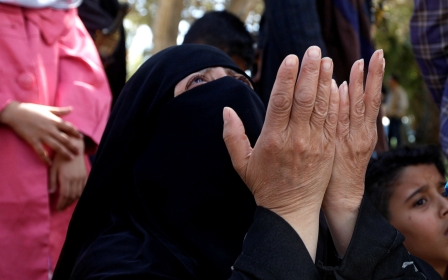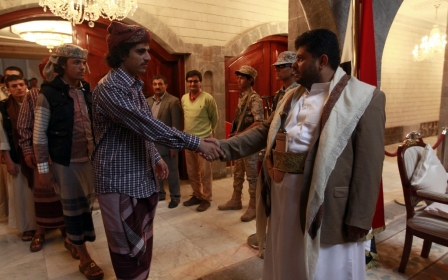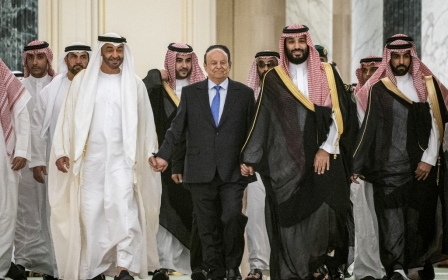'Saleh was everything': Yemeni ex-president's party divided two years after his death
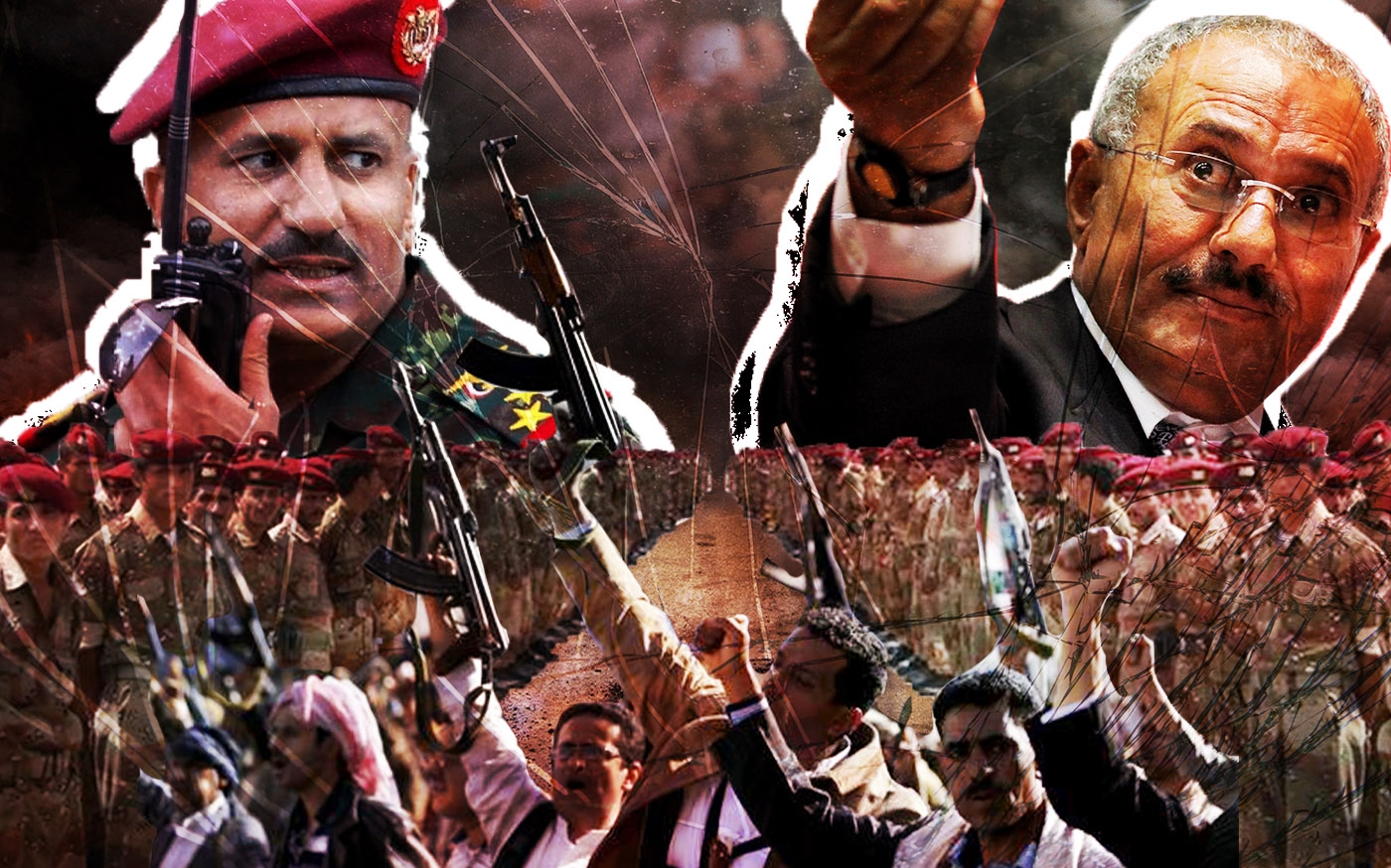
Two years after his death, the party of the former Yemeni president Ali Abdullah Saleh has disintegrated into small groups with varying loyalties.
Saleh, who ruled Yemen for 33 years, founded the General People’s Congress (GPC) party in 1982 and served as its leader until his death in 2017.
The GPC was the largest party in Yemen under Saleh’s leadership. But the Yemeni revolution against Saleh in 2011 and the subsequent civil war have left the party divided.
After handing over his power to his vice president, Abd Rabbu Mansour Hadi, in February 2012, Saleh allied with his party’s adversaries the Houthis (also known as Ansar Allah) in their protest movement and insurgency that seized control of the Yemeni capital Sanaa in early 2015.
The capture of Sanaa forced Hadi to flee to his hometown of Aden in February 2015 with a number of GPC leaders.
A month later, Saudi Arabia led a coalition of western-backed Arab countries to reinstate Hadi’s government. Meanwhile, Hadi fled Yemen on a boat and is now exiled in the Saudi capital Riyadh.
The GPC was then divided between supporters of Saleh in Sanaa and supporters of Hadi in Aden.
For two years, that division held, until Saleh announced he was turning against his erstwhile Houthi allies, prompting his assassination on 4 December 2017. From then on, the GPC has only gone through more fractures and changes.
Three groups
In the wake of Saleh's death, his nephew Tareq fled to Aden, thus splitting the GPC into three groups: the pro-Houthis, pro-Hadis and pro-Tareqs.
Though his former followers now have divided loyalties, their fealty to the slain ex-president largely remains intact.
“Saleh was loyal to the country,” a GPC member in Sanaa told Middle East Eye. “He was not a mercenary of Saudi Arabia or any foreign country, and we still adhere to his values and principles.”
The GPC member spoke on condition of anonymity because of security concerns in Yemen's Houthi-held capital. He told MEE that Saleh used to warn members of GPC against “the danger of Saudi Arabia”.
“Saudi Arabia is an old enemy of Yemen,” he said, adding that the Gulf kingdom “has been working to divide Yemenis”.
'He was not a mercenary of Saudi Arabia or any foreign country, and we still adhere to his values and principles'
- GPC member
When the Saudi-led coalition intervened in Yemen in March 2015 to recapture Sanaa from the Houthis, Saleh was fighting shoulder to shoulder with the rebels but the coalition held back from targeting the Yemeni leader.
That tactic appeared to pay off when Saleh switched sides two years ago. But the GPC member in Sanaa said Saleh made a grave mistake announcing loyalty to the coalition, costing his life and further dividing the party.
“That was the mistake of Saleh that led to his downfall. But he continues to be a leader who inspires us,” he said.
The party's disintegration is of some regret to GPC members. In Sanaa, many of them neither support the Houthis nor the coalition, but hide their opposition and distaste because of fears for their safety.
Backed by the UAE
To the soutwest of Sanaa is a different story.
When Tareq Saleh fled to the south, he established a personal army in the port city of Mocha, with the help of the United Arab Emirates.
The family's ties with the UAE go beyond Tareq, however. Ahmed Ali Saleh, Ali Abdullah Saleh’s son, was the Yemeni ambassador in the UAE from 2013 to 2015. He is still based in the UAE and maintains support within GPC elements in Yemen.
“Saleh was a great leader and we promised ourselves not to betray him, but we will do our best to take revenge for him,” Abdulraqeeb al-Kenani, a fighter with Tareq Saleh, told MEE.
“When Saleh realised that the Houthis are against Yemen, he told us to fight them,” he added.
“He was killed as a result of this statement, so we are following Saleh’s path in fighting the Houthis.”
Under his slain leader, Kenani fought alongside the Houthis on the western coast. Today, however, he battles against the Iran-aligned movement and has a bitter opinion of it.
“Saleh could have stayed silent in Sanaa and the Houthis would not have harmed him,” Kenani said.
“But he could not watch the Houthis destroy the country in front of him, so he spoke out and paid his life as a price.”
Saleh and the Houthis always seemed like strange bedfellows. Between 2004 and 201o, Saleh fought six battles against the Houthis in the city of Saada in northwest Yemen.
The founder of the Houthi group, Hussein al-Houthi, was killed during one of the campaigns, making Saleh a lifelong enemy of the group.
The Houthis also participated in the 2011 revolution against Saleh. But as circumstances on the ground changed, the two became drawn to one another against Hadi and his Saudi-backed forces.
“Remaining in Sanaa does not make you a supporter of the Houthis,” Kenani said. "Many GPC members in Sanaa do not dare to flee, so they flatter the Houthis to stay safe.”
Saudi 'liberated' Yemen
Another GPC group is based in Saudi Arabia. They are supporters of Hadi and the Saudi-led coalition that intervened to reinstate him, and believe Riyadh has performed admirably in its attempts to support the Yemeni president.
“The Yemeni army could not liberate any governorate from the Houthis, but when the Saudi-led coalition intervened, it liberated many governorates from them,” Ghamdan Ibrahim, a GPC member in the central Yemeni city of Taiz, told MEE.
“No one could deny the role of Saudi Arabia in the Yemen war. If they withdraw, the Houthis will take over the whole country.”
'The GPC’s members cannot meet again around one table. The division is deep'
- Fadhl Mohammed, political commentator
Ibrahim said that the Houthis are his main enemy as they led a coup against the Hadi government in Sanaa in 2014.
“They seized the country illegally, so fighting them should be a priority,” he said.
Ibrahim denounced Tareq Saleh for not backing Hadi, instead looking to build his own personal support.
“The GPC’s division has been due to the absence of a single leader for the party. I hope that Tareq and all other groups announce their loyalty to Hadi,” he added.
Hadi was the vice president and secretary-general of the GPC until November 2014 when he was replaced by Aref al-Zoka, who was later killed with Saleh.
The GPC ‘died with Saleh’
Fadhl Mohammed, a professor of psychology and commentator on the developments in Yemen, said that the GPC ended when Saleh died.
“The GPC means Ali Saleh. There was no system inside the party, Saleh was everything. Others were only followers,” he told MEE.
For Mohammed, the GPC factions have proved totally unable to mass under the single leadership of any man other than Saleh.
“We can see fighters of the GPC in Sanaa fight against members of the GPC in the south, and they shoot at each other in the battles,” he said.
“The GPC’s members cannot meet again around one table. The division is deep.”
This article is available in French on Middle East Eye French edition.
Middle East Eye delivers independent and unrivalled coverage and analysis of the Middle East, North Africa and beyond. To learn more about republishing this content and the associated fees, please fill out this form. More about MEE can be found here.


